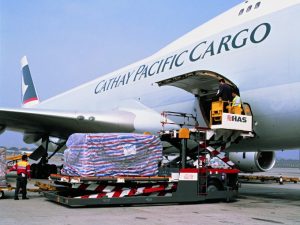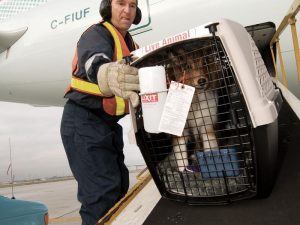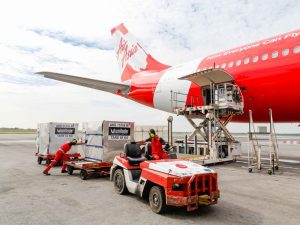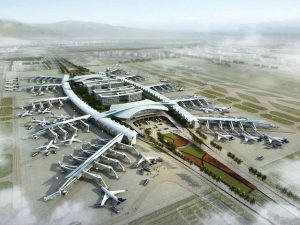Cathay Pacific has signed an agreement with Aemetis for the supply of 38 million US gallons of blended Sustainable Aviation Fuel (SAF) to be delivered over seven years beginning in 2025 from San Francisco International Airport. “The SAF purchased can reduce more than 80,000 tonnes of lifecycle carbon emissions, equivalent to the amount of carbon sequestered by more than 1.3 million tree seedlings grown for 10 years. The agreement is also part of the joint procurement initiative for SAF by the oneworld alliance, of which Cathay Pacific is a founding member,” said an official release. Augustus Tang, Chief Executive Officer said, “Cathay Pacific continues to reaffirm its commitment to addressing climate change despite these challenging times. In the past few years, we have announced our carbon net-zero by 2050 target and our goal of achieving 10 percent use of SAF by 2030. In doing this, we have built a robust SAF procurement strategy to help meet our goals. We are pleased that this agreement with Aemetis will contribute to that effort, and we hope it will also send the right signal to the SAF industry to encourage the much-needed investment and scaling up of its supply chain.”
Read More »National airlines adds fuel-efficient B747-400ERF
US based National Airlines announced the arrival of a fuel-efficient freighter to its fleet. Boeing 747-400 ERF is an extended range freighter. With registration N663CA (MSN 35237), it features a nose door and a large side door, the aircraft is a logical choice globally for sophisticated cargo movements across long distances, said release. “The induction is part of National Airlines’ current global fleet and network expansion approach to meet the massive demand to move huge shipments worldwide.” The release added, “The aircraft has a maximum gross payload of an incredible 128 metric tons (about 282,000 pounds). The nose door loading capability, a unique feature of this type of aircraft, gives National the capability to move customers’ shipments of any length, which is not possible with the B777 freighter. This aircraft is also particularly suitable for pharmaceuticals, seafood, perishables, and other cold chain shipments.” https://www.stattimes.com/aviation/b747-400erf-joins-national-airlines-fleet-1346507
Read More »‘India’s logistics to move at cheetah’s speed’
M Afzal Malbarwala, President, Air Cargo Agents Association of India shared his views on the recently launched National Logistics Policy and said it is a great gift to the logistics industry. “PM’s vision and his thoughts are very inspirational. He has given us the policy and now as a sector, we have to perform and show the progress and results. PM also praised the work done by the logistics industry during the pandemic which is a great booster. As mentione by the PM, logistics industry needs to perform at cheetah’s speed ensuring fast deliveries in the coming times and we have government’s support. It was an honour and inspiration to hear from such a great person. Today, with this policy, we are at par with any other country.”
Read More »NLP to address infra, procedural gaps in India’s EXIM trade
Prime Minister Narendra Modi launched the much-awaited National Logistics Policy in the National Capital on Saturday. Commenting on the same, veteran freight forwarder, Cyrus Katgara, Partner, Jeena and Company said, “The National Logistics Policy will accelerate the growth of the sector in the coming years as it aims to promote seamless movements of goods across the country and addresses the infrastructure, procedural gaps in India’s EXIM connectivity by creating efficient, reliable and streamlined cross border trade facilitation. The sectoral plans for cost effective logistics aligned with Gati Shakti initiative is poised to be a game changer and we look forward to its unfolding in the near future.”
Read More »Air Canada Cargo 1st to get re-certified for safe transport of live animals
Air Canada has become the first airline to be re-certified by the International Air Transport Association (IATA) for the safe transport of live animals by Air Canada Cargo. The carrier has been honoured with the IATA’s Center of Excellence for Independent Validators for Live Animals Logistics (CEIV Live Animals) recertification following the successful completion of the verification process. Jason Berry, Vice President, Cargo at Air Canada said in an official release, “We are very proud to be recognized for our work in operating to the highest global standards for the worldwide transport of all live animals and being the first airline to be re-certificated continues to position Air Canada Cargo as an industry leader. Every year, we expertly and safely handle thousands of complex shipments, from rescued dogs to endangered animals transported in conservation efforts and family pets. Air Canada Cargo’s dedicated employees handling animals are specially trained, and I thank them for their diligence in treating all animals as precious cargo while in our care.”
Read More »AirAsia X plans to ramp up cargo service, adds freighters
To increase its revenue contribution to 20-25%, from single digits, in addition to synergising passenger routes with airlines in its group to improve efficiency as airfares rise, AirAsia X plans to ramp up its cargo service. Air Asia X is the long-haul affiliate of AirAsia and Unilode Aviation Solutions. Tony Fernandes, acting group chief executive of AirAsia X, said cargo services will make up a bigger proportion of total revenue over the next few years. In addition to its current wide-body Airbus A330 fleet, AirAsia X might also use the narrow-body Airbus A321 for cargo flights. The company is planning to add 362 A321 jets from the second quarter of next year until 2035, and the plane could be more efficient for shorter routes than the A330.
Read More »New logistics park at MOPA to boost cargo ops by 2023
GMR Airport’s cargo division is creating infrastructure and ground facilities at the upcoming airport at Mopa that will encourage cargo operations. GMR is working on plans to shift the cargo that is currently being transported by road to Mumbai, Hyderabad, and Chennai onto air freighters from the first quarter of 2023. GMR Goa International Airport Limited (GGIAL), a subsidiary of GMR Airports Infrastructure, plans to set up a logistics park on the 232 acres of commercial land available at Mopa. According to the reports, a world-class integrated air cargo terminal is being developed which is capable of handling wide body Boeing 747s, Boeing 777s and all of kinds of major bulk cargo for which the only option today is Mumbai, Hyderabad, or Chennai. So rather than cargo going out of Goa to Mumbai, cargo will start coming to Goa for shipment abroad.
Read More »MoU inked to manufacture long-range cargo drones
Dronamics has partnered with composite manufacturer Cotesa to manufacture long-range cargo drones in Europe. The partnership with Cotesa, a European manufacturer of high-quality composite fibre components for aerospace and automotive companies, supports the demand for Dronamics’ commercial routes to be launched in Europe in 2023. Dronamics recently became the first drone cargo company to obtain a European drone airline license. Its Black Swan drone is the only cargo UAV that can carry 350 kg (770lb) up to 2,500 km (1,550mi) and will be manufactured at Cotesa’s facilities in Germany. “We are delighted to sign an MoU with Cotesa. This agreement is signed to produce the Black Swan in their German facility supports our promise to enable same day delivery for everyone, everywhere, and the start of DRONAMICS’ commercial operations as the first drone cargo airline on the continent next year,” said Svilen Rangelov, Co-Founder and Chief Executive, Dronamics.
Read More »UPS’s order for eight freighters boosts Boeing’s sales
UPS is delivering for Boeing, boosting Boeing’s August sales with an order for eight freighters. The aircraft maker said UPS’s order for eight cargo planes was the biggest order out of a total order of 26 cargo planes. It may be noted Boeing also took orders for 13 more orders from 737 Max planes, including two from American Airlines. A Boeing official said, two 787s released to American Airlines were not included in the sales bucket as the planes were undergoing some repairs.
Read More »EUR 500 million investment in India for MCF warehouses
DHL Supply Chain (DHL) announced a EUR 500 million investment in India over the next five years. DHL will own and operate wholly owned large multi-client sites in India because of this transaction, adding twelve million square feet of warehouse space to the Group’s existing portfolio, says official press release. The expanded warehouse capacity is intended to better serve rising industries such as e-commerce, retail, consumer, life sciences, technology, engineering, and manufacturing, and automotive. “Majority of investment will go towards construction of large warehouses and logistics centers. In India, we will have a multiple customers facility, which means we can deploy people across multiple customers or bring in economies of scale,” said Vikas Anand, MD, DHL Supply Chain India.
Read More » Cargo Breaking News
Cargo Breaking News









